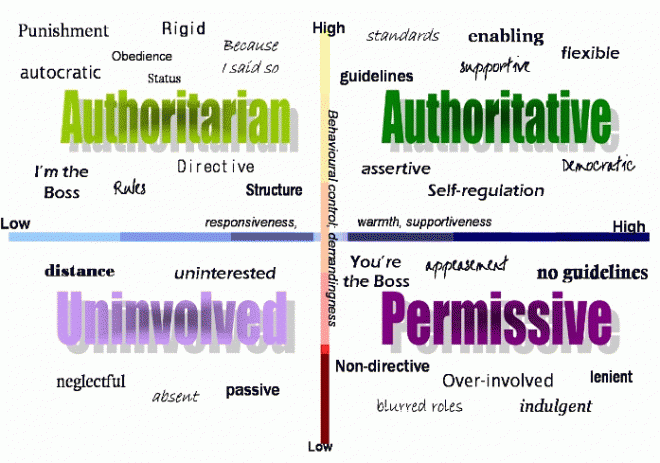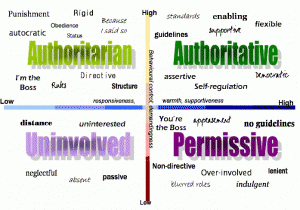
Parents need to realize the part they play as individuals in the development of their child. The way their child develops is dependent on the way parents rear their child. The person the child becomes is based on factors such as the environment at home, school and the various experiences the child has, are what makes children who they really are and which forms their personality. Therefore being aware of the parenting style used and its effects is so important.
Based on extensive research psychologists have uncovered different types of parenting styles used and the effects. Baumrind (Baumrind, 1967) a renowned psychologist identified 3 Styles of Parenting used by most parent’s namely Authoritative Parenting, Authoritarian Parenting and Permissive Parenting styles. Upon further research Maccoby & Martin (Maccoby & Martin, 1983) determined a 4th style of parenting. It was found that most parents practiced either one of the 4 Parenting Styles, when disciplining a child. These 4 types of parenting styles evoke a combination of either acceptance and responsiveness or demand and control.
The 4 types of Parenting styles are as follows:
The Authoritative Parenting Style: this type of parenting establishes rules and guidelines for a child to follow but is a democratic style of parenting. Authoritative parents are more responsive to their children and are willing to address questions. If the child fails to meet their expectations, these parents are more nurturing and forgiving rather than punishing. These are parents that apart from monitoring their children they even impart clear standards for the child’s conduct. Such parents are assertive but not intrusive or restrictive. The disciplinary methods used are supportive instead of punitive and promote assertiveness, self regulation, cooperative and responsible behavior. This is the ideal style of parenting.
The Authoritarian Parenting Style: in this type of parenting, rules and guideline are laid out and children are expected to follow them. If children don’t abide by these rules than they are punished, these parents usually fail to explain the reasoning behind the set rules. If a child questions, the parent may simply say, “Because I said so”. Such parents have high demands but are not responsive to their children. These parents are obedience and status oriented according to Baumrind. They expect their authority to be followed without question.
The Permissive Parenting Style: these are indulgent parents, who have very few demands to make from their children. These parents rarely discipline their children as they have relatively low expectations of maturity and self – control. Permissive parents are more responsive than demanding. They are non – traditional, lenient, don’t require mature behaviour, tend to allow considerable self regulation and avoid confrontation. These parents are usually nurturing and communicative; often take the role of a friend rather than of a parent.
The Uninvolved Parenting Style: these parents display few demands, low responsiveness and low communication. They fulfill the child’s basic needs but are detached from their child’s life. In extreme cases such parents may even reject or neglect the basic needs of the child.
Several studies that were conducted identified that if a child is happy, responsible, kind, good at problem solving, self motivated, confident and cooperative and an excellent student it is the result of an Authoritative Parenting Style. These children tend to be Leaders displaying leadership qualities. If a child is moody, anxious, well behaved and an average to good student is most likely to be the product of an Authoritarian Parenting Style. Such children tend to be a follower rather than a leader. Those children displaying behaviour such as demanding and whiny, easily frustrated, lacking kindness and empathy, are poor to average students are a product of Permissive Parenting Styles and are likely to be followers too. Finally children displaying behaviour such as clingy and needy, inappropriate and rude, likely to get into trouble, are poor students; prefer to be followers are a product of the Uninvolved Parenting Style.
There is a differing parenting style because it is dependent upon factors such as the culture, personality, family size, parental background, socioeconomic status, educational level and religion of the parent. Therefore each parent implements a different style due to their unique upbringing. Some families have a combination of parenting styles for instance a mother displaying an authoritative parenting style while the father displays a permissive parenting style. Apart from these factors a child’s behaviour is also dependent upon culture, children’s perceptions of parental treatment and social influences.
Nevertheless, each of the different parenting styles impact and influence the development of a child considerably. Baumrind’s observation found that the most ideal and balanced style that leads to the child being mature, independent and socially responsible is the Authoritative style. And the style that leads children to become delinquents is the Uninvolved style because of the lack of parenting, affection and care from the parent; the child resorts to acting out badly for attention.

